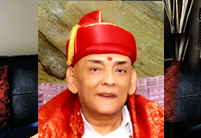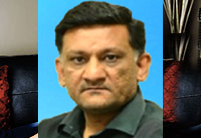As noted above, this is an initiative of
Inter-University Research Centre (IURC), and IURC in turn is a
platform floated by Confederation of Indian Universities (CIU).
Being a part of CIU, IURC is sponsored by almost all the top
universities and university level institutions in India.
But the faces behind this initiative also deserve to be noted.
Getting to know this initiative, in some ways, would be
incomplete without getting to know the people who have
visualized this platform, people who have spent countless hours
creating the blueprint, agenda, organizational structure etc
needed to achieve what we intend to achieve, those who spared no
effort to reach out to like-minded people, in India as well as
in the world outside.
Dr. Priyaranjan Trivedi

As noted above, this is an initiative of
Inter-University Research Centre (IURC), and IURC in turn is a
platform floated by Confederation of Indian Universities (CIU).
Being a part of CIU, IURC is sponsored by almost all the top
universities and university level institutions in India.
But the faces behind this initiative also deserve to be noted.
Getting to know this initiative, in some ways, would be
incomplete without getting to know the people who have
visualized this platform, people who have spent countless hours
creating the blueprint, agenda, organizational structure etc
needed to achieve what we intend to achieve, those who spared no
effort to reach out to like-minded people, in India as well as
in the world outside.
Dr. Priya Ranjan Trivedi, President of CIU and founding Chairman
of IURC, is the soul behind this initiative. It is he who
incubated the idea initially. Having developed the very broad
outlines of the idea in his mind, he roped in the first few
critical people, who worked under his guidance to develop the
idea and to create a more detailed picture of the same.
It is he who provided, and continues to do even today,
continuous support and encouragement to the first few people who
were trying to work on this enormous problem statement. It is he
who instilled the belief among the people around him that when
good intentions combine with smart work and collaborative energy
of large number of people, everything can be achieved.
He completed his undergraduate engineering (Bachelor of
Engineering) from the prestigious Birla Institute of Technology,
Mesra, India in the year 1973. Subsequently, he also did his
M.Tech from the same institution. In the subsequent years,
taking into account the importance of taking a managerial
perspective of things, he also completed his MBA. Later on, when
he developed a keen interest in the emerging field of human
rights, he completed his Ph.D. in human rights, with
specialization in conflict resolution.
He became involved in the field of institution building during
1977-78, when he laid the foundation of Indian Institute of
Business Management (IIBM) at Patna, in collaboration with his
close friend, Dr. Uttam Kumar Singh, who was also equally
passionate about the cause of institution building.
The journey that started with the IIBM story never stopped. In
fact, with every passing year, his passion in and commitment to
the cause of finding solutions to ‘big problems of the day’ only
increased in intensity. He has continuously drilled the motto of
‘Job giver, not seeker’ among all the students that pass out of
any of the institutions founded / mentored by him.
In fact, very early on in his life, perhaps immediately after
completing his engineering education, he realized that the only
way a vast, densely populated country like India could ever
provide good employment opportunities to all its citizens, is to
foster a spirit of entrepreneurship among its people. He was one
of the very first people who espoused the view that people of
India are by nature entrepreneurial, even though Government of
India, till quite recently, praised the virtues of an
all-powerful, centrally planned, bureaucratically administered
way of building the country.
Some of the other institutions founded / mentored by him include
prestigious ones like Dr. Zakir Husain Institute for Non-Formal
and Continuing Education (1980), Institute of Hotel Management,
Catering Technology & Applied Nutrition (1980), Indian Institute
of Ecology and Environment (1981), National Centre for
Developmental Communication (1982), National Institute of
Computer Education (1983).
He even started the practice of encouraging State Governments,
especially from remote and relatively less developed regions, to
nominate students from their jurisdictions to pursue high-end,
job-oriented courses at the institutions under his control.
Students from these institutions have gone on to occupy top
positions in different public and private sector organisations
in India as well as in other countries.
He was the first person in India to have advised the Government
of India and the State Governments, way back in the year 1992,
to allow the establishment of State Universities with external
funding provided by public charities and philanthropic
organisations. Towards this end, he has worked closely with
State Governments of Himachal Pradesh, Uttarakhand, Bihar,
Jharkhand, Arunachal Pradesh, Nagaland, Meghalaya, Haryana,
Rajasthan, Punjab, Gujarat, Uttar Pradesh, Madhya Pradesh,
Chhattisgarh, Karnataka, Sikkim and Jammu & Kashmir.
The Global Open University of Nagaland, established by the
Government of Nagaland, and Indira Gandhi Technological &
Medical Sciences University are shining examples of his vision,
providing great service to the people of these states and
beyond.
Dr. Sidharth Shankar

Dr. Sidharth Shankar has been rendering his
services to Confederation of Indian Universities (CIU) as
Director (Operations), looking after the affairs of member
universities located in the western states of India i.e.
Maharashtra, Gujarat, Goa, Rajasthan and the Union Territories
of Daman & Diu and Dadara & Nagar Haweli.
He completed his undergraduate and post-graduate studies from
Jawahar Lal Nehru University, New Delhi, one of the most
prestigious universities of India. After completing his BA
(1996-1999) & MA (1999-2001) in Germanic Studies, he worked for
various companies in Information Technology (IT) space where he
looked after the markets in Western Europe. Thereafter, he
enrolled for MBA program (2007-08) from Icfai Business School,
Hyderabad.
After completing his MBA, he went back to pursue his corporate
career. Among his notable achievements during this period was
raising the first of its kind TV channel in India, a channel
located in the backward region of Bihar. This TV channel, Maurya
TV, was promoted by noted film maker Mr. Prakash Jha. This was
the first TV channel that provided unbiased, true reporting from
Bihar, one of the most challenging geographical locations in
India, a location with a history of endemic violence, plagued by
extreme left wing inspired insurgency and above all, massive,
indescribable poverty.
Before the establishment of Maurya TV, news from Bihar was all
about murders, political corruptions and various other kinds of
bureaucratic and social malpractices. Very few news channels had
dedicated, full-time reporters in that state. And those that
had, managed with just one person, who operated out of the state
capital, but was expected to cover that vast state of around 80
million people, with an area almost as large as that of France
or Germany.
For the first time, Maurya TV brought on to the television
screens incredibly inspiring stories of ordinary people
struggling to build their lives in an otherwise challenging
environment. For the first time, people could now see wonderful
stories of people doing ground-breaking work such as raising
business organizations in an area dubbed by the established
media houses as the graveyard of private enterprise.
This channel discovered and showcased multiple stories of
people, rising against odds to build no-frills educational
institutions that produced brilliant students who went on to
make a mark for themselves in renowned institutions like Indian
Institute of Technology (IITs), Indian Institute of Management (IIMs),
Indian Institute of Science (IISc), Tata Institute of
Fundamental Research (TIFR), All India Institute of Medical
Sciences (AIIMS) etc.
During this period, while interacting with entrepreneurs and
policy makers of the region, Dr. Shankar developed an interest
in public policy. He realized that there was an urgent need for
policy innovations if backward regions like Bihar were ever to
break out of the vicious cycle of poverty, violence and
recriminations. It was during that time that he started working
closely with the State Government of Bihar. This experience of
working with top policy makers helped him learn that, even in
the ‘dead zone’ of Bihar’s politics and administration, there
were people who were trying to make a difference.
Subsequently, after spending close to 5-6 years in corporate
sector, he enrolled for PhD in Management from B.R. Ambedkar
Bihar University, Muzaffarpur. His Ph.D. was on the workings of
Indian Railways and how big transportation projects like Indian
Railways, if they are run properly, do make a significant
difference to the developmental landscape of remote regions like
Bihar.
After completing his PhD, Dr. Shankar started working with
various political parties, NGOs and think tanks as policy
researcher. During this period, he worked with prominent
political personalities from all political hues. During this
period, he also devised electoral campaigns for different
political parties in the context of state and municipal
elections.
While pursuing his policy research interests, in 2018, Dr.
Shankar came in contact with Dr. Trivedi who encouraged him to
work for the cause of education and to become an institution
builder. Dr. Shankar found the approach of Dr. Trivedi extremely
inspiring and accordingly, took the decision of joining CIU as a
dedicated resource.
He nurtures ambition of helping IURC grow up to be a truly
world-class institution specializing in research on issues
affecting India and her immediate periphery.
Mr. Ritesh Shukla

Mr. Ritesh Shukla is a successful journalist in
India, working for the largest Hindi language newspaper, called
Dainik Bhaskar. He works in the editorial section, handling news
sourcing from foreign countries. He also writes columns in the
same newspaper. As part of his assignment, he also conducts
interviews with leading international personalities like heads
of states, celebrated academicians, business leaders, social
reformers etc. Before his stint with the Hindi edition of the
newspaper, he used to work as Chief Sub-Editor in the
short-lived English language edition of the same group. That
edition was called DB Post. It was the most successful English
language tabloid in Central India. But, due to certain problems
on the business front, DB Post had to be closed down around the
time when India was hit by the first wave of Corona Virus.
Before joining Bhaskar Group as a journalist, for around a
decade, Mr. Shukla worked as a project manager with some of the
most important companies in the information technology space in
India. As part of his assignment with those companies, he used
to handle customers from Europe and North America.
Interestingly, for around 2-3 years after quitting his corporate
career, and before joining Dainik Bhaskar as a journalist, Mr.
Shukla had also served as a teacher in one of the Engineering
Colleges in Bhopal. During that time, he also participated
actively in the formation of the upcoming political party called
Aam Aadami Party (AAP), whose convener, Mr. Arvind Kejriwal
later went on to become the Chief Minister of Delhi.
However, due to differences with the leadership of the party, on
the issue of course of action to be followed by the party in
Madhya Pradesh, Mr. Shukla ultimately severed his association
with the party. Since then, he has never been associated with
any political party on a formal basis.
Mr. Ritesh Shukla holds a Bachelor degree in German Language &
Literature from Jawahar Lal Nehru University, New Delhi. After
completing his BA from JNU, he enrolled for an MA in English
language from Barkatullah University, Bhopal. He also completed
his LLB from the same university.
He also has interest in spirituality, and in occult sciences
like astrology. In fact, he is widely respected as a very
competent and insightful astrologer. He is often invited by
religious organizations to participate in spiritual discourses
and to talk on various spiritual and philosophical issues.
He is associated with CIU and IURC on an honorary basis, and
provides assistance in research and outreach related initiatives
of the organization. IURC believes that going forward, he is
going to play a significant role in the realization of all the
plans that have been prepared for the organization.
IURC is sure that it is only when many more people like Dr.
Shankar, Mr. Shukla, and people even higher up in the competence
ladder, join the organization, would it be truly able to
effectively implement all its plans, and really make a
difference. Therefore, like all good ancient shamans, invoking
the spirits of ancestors and the power of divinity just before
the troops marched into the battle field, IURC too would like to
give a clarion call to all concerned, to come and join hands to
make a difference to the future of humanity as a species
surviving on the only known home, mother Earth.








